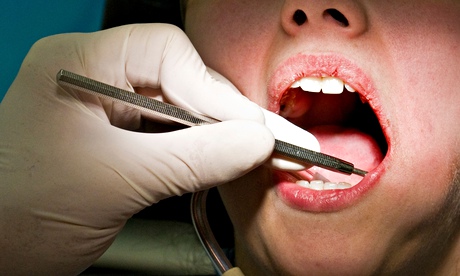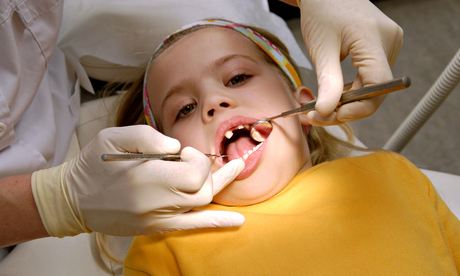The number of tooth extractions on children aged four and under in English hospitals has risen by almost a quarter over the past decade.
NHS data obtained by the faculty of dental surgery at the Royal College of Surgeons (RCS) shows there were 9,206 extractions within the age group in 2015-16 compared with 7,444 in 2006-07 – a 24% rise.
The figures prompted calls for parents, the government and the food industry to take action to reverse the alarming trend.
Prof Nigel Hunt, dean of the RCS’s faculty of dental surgery, said: “When you see the numbers tallied up like this it becomes abundantly clear that the sweet habits of our children are having a devastating effect on the state of their teeth.
“That children as young as one or two need to have teeth extracted is shocking. It’s almost certain that the majority of these extractions will be down to tooth decay caused by too much sugar in diets.”
The rise came as the number of children aged four and under in England rose by 16% over the same period.
Hunt said people should not be complacent about the removal of baby teeth as they “set the pattern for adult teeth, including tooth decay”.
He said 90% of tooth decay is preventable through reducing sugar consumption, regular brushing with fluoride toothpaste and routine dental visits, but that 42% of children did not see a dentist in 2015-16 despite treatment being free for under-18s.
“We’d like to see a significant proportion of the money raised through the government’s sugar levy spent on oral health education,” he said. “Sugar has an almost immediate damaging impact on teeth and if we teach parents and children to cut down on sweet treats and look after their teeth properly, there will be a positive knock-on effect for childhood obesity rates too.”
The British Dental Association (BDA) said that ministers in England had offered a “collective shrug” to the problem compared with dedicated programmes run by the Scottish and Welsh devolved governments “which have had transformative effects on children’s oral health”.
The BDA chair, Mick Armstrong, said there were deep inequalities which “require real commitment from government, not just token efforts”.
Katharine Jenner, campaign director at Action on Sugar, lamented the rise of added sugar but also called for a change in culture.
“Added sugar has found its way into almost all food and the use of sugar as a means to calm, entertain or reward children has become normalised, whereas sugar should be an occasional treat,” she said.
“Sugar-sweetened drinks are the biggest contributor of sugar in the diets of children and teenagers and, unless they are reduced, these drinks will still contribute to the high levels of obesity, type 2 diabetes and tooth decay – all of which are preventable and cost the NHS billions of pounds each year.”
The latest national diet and nutrition survey showed that, in 2012-2014, children aged one-and-a-half to three years old consumed 63g of sugar-sweetened soft drinks a day on average.
The RCS figures also show more than 34,000 extractions were performed on children aged nine and under in each of the past two years, compared with 27,760 in 2005-06.
A government spokesman said: “We are introducing a soft drinks levy, as well as a broader sugar reduction programme, to encourage food and drink companies to reduce the amount of sugar that is in popular products in the first place.”
Public Health England advised parents to ensure their children follow good dental hygiene, including limiting sugary food and drink.
Tooth extractions rise among under-fours

